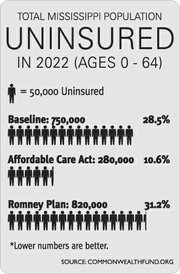If elected, Gov. Mitt Romney has vowed to repeal or replace much of the Patient Protection and Affordable Care Act, commonly called Obamacare. What he will replace it with is open to speculation; however, the budget plan the U.S. House of Representatives passed in 2011 and 2012 provides a credible point of reference. Romney’s running mate, Wisconsin Rep. Paul Ryan, was chairman of the House Budget Committee.
It is with that in mind that the Kaiser Commission on Medicaid and the Uninsured analyzed the impact of the House Republican budget on Medicaid at the national and state levels, releasing an issue paper on the subject in October.
Beyond repealing the PPACA, the House budget proposes converting “Medicaid’s structure from an entitlement with guaranteed federal matching payments to a block grant with capped federal funding to states. The block grant would start in 2013 and grow annually with population growth and inflation,” the paper states.
Repealing Obamacare would cut federal spending by $932 billion from 2013, when the Medicaid expansion in the states is scheduled to begin, through 2022. Block grants to the states represent another $810 billion in cuts. Combined, the cuts would eliminate 38 percent of federal spending on the program. For Mississippi, the cuts would be deeper: Under the House budget, the state would get 40 percent less money from the federal government than it would under the Affordable Care Act (see figure 3, below). In 2022, federal funds to Mississippi drops another 8 percent, to 48 percent less. Under the ACA, Mississippi stands to receive $8.2 billion in 2022; under the Republican plan, $4.2 billion (see figure 3).
Medicaid enrollment would also be affected. Obamacare promises to provide health insurance for an estimated 32.9 million Americans by 2022, still leaving about 27 million uninsured, The Commonwealth Fund estimates. Under the Republican budget, the number of uninsured Americans climbs by 12 million almost immediately, resulting in 72 million uninsured in 2022. For Mississippi, the numbers are more dramatic. Under the Democratic plan, the number of uninsured drops to 10.6 percent; under the Republican plan, the uninsured rise to nearly one-third of the population.
Kaiser estimates that Mississippi would have to increase its Medicaid spending by $2.1 billion in 2022 to insure the same number of low-income citizens as the PPACA would do, an increase of 131 percent. (see figure 3)
“States could avoid some of the enrollment cuts generated by the block grant by increasing spending from their own resources, but completely avoiding enrollment cuts would require very large increases in spending to offset the reduction in federal funds,” the Kaiser paper states. “… The proposed changes and reductions in federal financing for Medicaid under the House Budget Plan would almost certainly worsen the problem of the uninsured and strain the nation’s safety net. Medicaid’s ability to (provide care to many low-income individuals) would be significantly compromised under this proposal, with no obvious alternative to take its place.”





Comments
Use the comment form below to begin a discussion about this content.
comments powered by Disqus